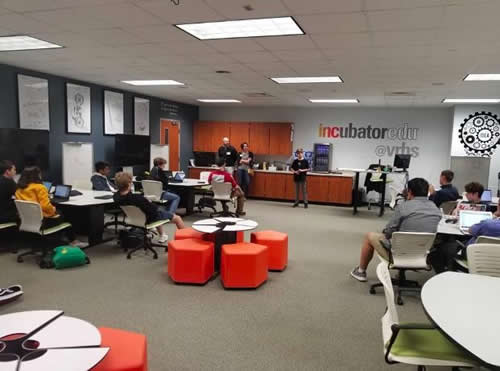It was 2017 when I first heard that a business incubator program was starting at my high school, Vista Ridge High School in Cedar Park, TX. I was curious as to what this class could offer me. I decided I would give it a try. Little did I know, I was about to embark on a journey that would forever change me and the way I see my future unfolding.
Grades aren’t everything, they said
Every high school student knows that to be considered for admission into a good college, you must balance not only a full course load, but extracurriculars and community service as well.
Related content: How to instill an entrepreneurial mindset in your district
I was already heavily involved in the robotics team, taking multiple Advanced Placement courses, and working part-time. I thought INCubatoredu would be interesting, but my real motivation was to use the course as one more addition to my college admissions portfolio.
Not your everyday high school classroom
The shift in mindset started the minute I entered the classroom. The physical layout and working environment were unlike any I’d ever experienced. We were told the classroom was designed to model the real working world. Instead of desks, there were tables for us to collaborate and individual working spaces very similar to an office with cubicles and larger conference rooms.
During the course, we did not learn about entrepreneurship by reading a textbook or conducting online research–we learned by doing. At the start of the year, we formed company teams and started by identifying a problem. Then, we worked to develop hypotheses about a business concept, test those hypotheses, adapt, and continually learn and improve.
Throughout the school year, we worked to build a business model, competitive analysis, financial model, communications plan, and a pitch deck. At the end of the year, we presented our business in a final shark tank-style pitch event. The in-class time was spent collaborating and doing what was necessary to bring our business to life. It was so different not having tests and quizzes. The structure and freedom actually allowed us to work harder and develop time management skills.
Our instructors were not certified teachers, but actual entrepreneurs and industry experts from the Austin business community who volunteered to teach components of the LEAN start-up methodology. Each team was paired with a volunteer mentor who would help guide us through the process.
Early in the school year, I stopped thinking about college admissions and started digging into the dream of starting my own company. I realized this was not a simulation, but the real deal — I could prove I didn’t have to wait until after college to achieve real-world success.
Everything is different now
Two years later, I’m now the CEO of a company called Crush-It, along with two other classmates who are not only business partners but close friends. We incorporated the summer of 2018 and are in the accelerator phase of our development.
We have a viable product and are in the process of finalizing our go-to-market and initial product launch. I’m now a regular on LinkedIn and my professional network is growing daily. Most important are the relationships I have established that will transcend high school and beyond.
This class went from being a “program” to real-life experience; from being a “means to an end” to the beginning of a new approach for achieving my goals. I am lucky to have had the opportunity many entrepreneurs wish they had. Now, I have a strong foundation of business-savvy skills, which not many college freshmen possess.
I genuinely believe this course made an impact on my acceptance to college. This experience helped me think outside the box and discover new solutions to problems I never knew existed. It also taught me how to talk to people and convince them that I’m worth their time which is very important for jobs.
I hope other high school students and teachers will read this and be inspired to join similar programs offered at their schools, and if not, I hope others will realize you’re never too young to design your own future.
- 4 ways to encourage play in education - April 25, 2024
- CoSN IT Leader Spotlight: Lisa Higgins - April 25, 2024
- It’s time to pay student teachers - April 25, 2024

